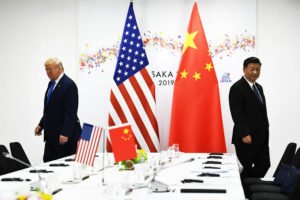A year of dramatic anti-government protests preceded Beijing’s decision to push forward its own national security law for Hong Kong on Friday.
The Chinese government said it will draw up plans to impose national security legislation on Hong Kong after multiple failed attempts to pass similar laws in the territory’s local legislature last year.
According to the resolution put forward at the National People’s Congress (NPC) on Friday, the new law is intended to prevent and punish acts in Hong Kong that threaten national security and encompasses secessionist and subversive activity as well as foreign interference and terrorism.
What is it?
Under Article 23 of the mini-constitution, The Hong Kong Special Administrative Region shall enact laws on its own to prohibit acts like treason, secession, sedition, and subversion against the Chinese government and the theft of state secrets. The local government’s failure to get such laws through the legislature is the reason that Beijing now takes matters into its own hands. And that has sparked concerns over the fate of the “one country, two systems” blueprint that has guided Hong Kong, since, the handover.
The territory was handed to China after British colonial rule ended in 1997 and the region was recognized as being distinct from mainland China and has been granted special protection on that basis, aimed at guaranteeing freedoms not granted on mainland China. “One-Country Two-Systems” framework was supposed to guarantee Hong Kongers way of life until 2047.
What the criticism is about?
Given China’s treatment of political activist, flawed legal system, and poor human rights record, Veteran democrats from Hong Kong have expressed fear that crimes such as subversion could be used arbitrarily as a “one-size-fits-all” charge against activists.
Critics point to the case of Nobel Peace Prize laureate Liu Xiaobo, sentenced to 11 years in prison for inciting subversion, as an example of how national security laws might be used to clamp down on dissidents.
By enacting the national security law through promulgation, opposition politicians have said there was no room left for discussion or negotiation in Hong Kong on how the bill should be drafted. They fear the law would be akin to certifying the death of one country, two systems, as it would allow Beijing to install a new and unregulated legal system in Hong Kong.
US response to China
The United States has joined a chorus of international concern ratcheting up its anti-China rhetoric. U S condemned China’s effort to take over national security legislation in Hong Kong, calling it “a death knell for the high degree of autonomy” that Beijing had promised the territory.
President Donald Trump said if Beijing passed the law, the US would “address that issue very strongly.”

The US government responded to China’s tightening grip on Hong Kong bypassing the Hong Kong Human Rights and Democracy Act 2019 last fall that requires the secretary of state Mike Pompeo to make a determination whether Hong Kong’s promised autonomy over all matters except for foreign affairs and defense is being eroded by Beijing.
If Mike Pompeo determines that Hong Kong’s “one country, two systems” arrangement is fraying, Mr. Trump can revoke certain economic and trade privileges Hong Kong enjoys with the US that is not extended to China as a whole.
What is clear is that the legislation is likely to fundamentally change Hong Kong’s relationship with the United States.
An additional risk from the US is the designation of Hong Kong as a distinct trading jurisdiction compared to mainland China, which grants it special trade privileges that are not available to the rest of the country.
If the US government decides to revoke these privileges, Hong Kong’s economy, which is already suffering its steepest recession since records began in 1974, following last year’s protests and the coronavirus pandemic, could find itself in even more jeopardy.
The American Chamber of Commerce in Hong Kong has said that anything that changes the status of the territory “would have a chilling effect not only on U.S. trade and investment in Hong Kong but would send negative signals internationally about Hong Kong’s trusted position in the global economy.”
Amnesty International also warned: “This attempt to bulldoze through repressive security regulations poses a quasi-existential threat to the rule of law in Hong Kong and is an ominous moment for human rights in the city”.
“Especially having gone through almost one year of disruptions, violence, and uncertainties, anything particularly in safeguarding national security that will help stabilize the environment is indeed very good,” says Chinese officials.
Experts say international pressure isn’t going to change Beijing’s mind. It’s not going to have any impact on Beijing’s policy towards Hong Kong.
However, the big question remains- is Hong Kong moving from a hybrid system which it had since the handover to a more authoritarian system?
Source: ANI